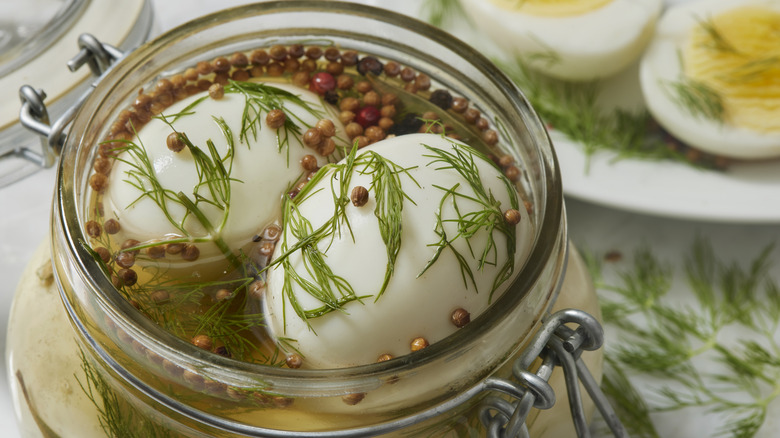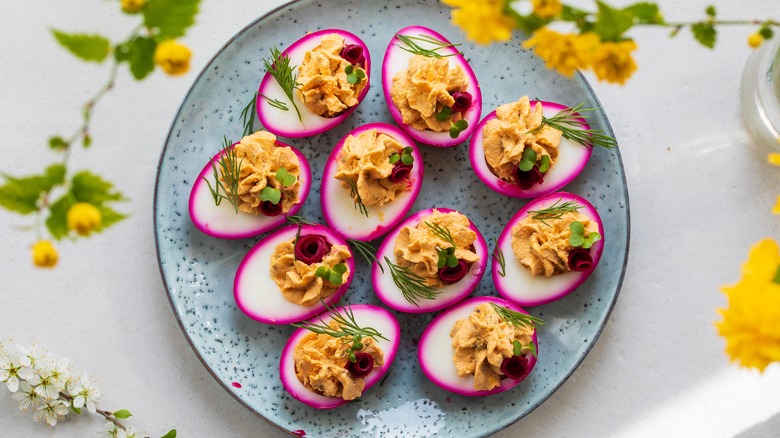Pickling Is The Tasty Way To Upgrade Your Hard Boiled Egg
When the Pilgrims sailed over from England on the Mayflower, one of the foods that sustained them on the voyage may have been a barrel of pickled eggs. Using vinegar to preserve eggs seems to predate even the Pilgrims by several centuries, though, as a 14th-century Arabic manuscript speaks of covering boiled eggs in vinegar. The main reason why people may have started pickling eggs back in the days before refrigeration is that it helps them to last longer — up to three or four months, as opposed to just two weeks for uncooked, unwashed eggs kept at room temperature. Even in the refrigerator, hard-boiled eggs will only last for about a week, but immersing them in vinegar helps to prevent the growth of potentially harmful bacteria.Besides lending the eggs longevity, pickling also makes eggs much more flavorful.
Boiled eggs alone are actually pretty bland, especially the whites. Pickling, however, gives even this part of the egg some much-needed tang, while the acidity helps to offset the richness of the yolks. Pickled eggs can also taste a bit sweet if the pickling solution contains sugar, while they may be somewhat salty if enough seasoning is used. The latter quality helped them to become a popular (and often complimentary) bar snack in the 19th and 20th centuries since the salt made patrons thirsty so they'd order more drinks. Even if pickled eggs are no longer free, they still pair perfectly with beer — their sweet and salty sourness helps to balance the bitter beverage.
Making and using pickled eggs
Pickled egg recipes start with boiling the eggs, then letting them cool to the point where they can be peeled. Once the eggs are out of their shells, they're packed into a jar and covered with vinegar. The vinegar is usually heated along with other seasonings, then poured over the eggs while still hot since this helps make the whites less rubbery. Plain distilled white vinegar is typically used, but cider vinegar can work if apple-y-tasting eggs appeal. If you want pretty pink color, you can also add the liquid from a can of pickled beets. (Thank the Pennsylvania Dutch for this variation.)
Besides salt and sugar, some of the ingredients that may be used to flavor pickled eggs include chiles, cloves, garlic, mustard seeds, onions, and even that old-timey candy, cinnamon Red Hots. While some recipes say pickled eggs can be ready to eat in as little as 24 hours, others recommend waiting a few weeks to let the flavors develop. Modern food safety standards also dictate that the eggs be kept in the refrigerator.
Pickled eggs make for a satisfying standalone snack, with or without beer, but can also be used to make egg salad sandwiches more interesting or give deviled eggs a tangy upgrade (and a colorful one, if you opt to use the beet-pickled kind). They're also perfect for Scotch eggs since the sourness helps counter the heaviness from the sausage and fried crumb coating.

